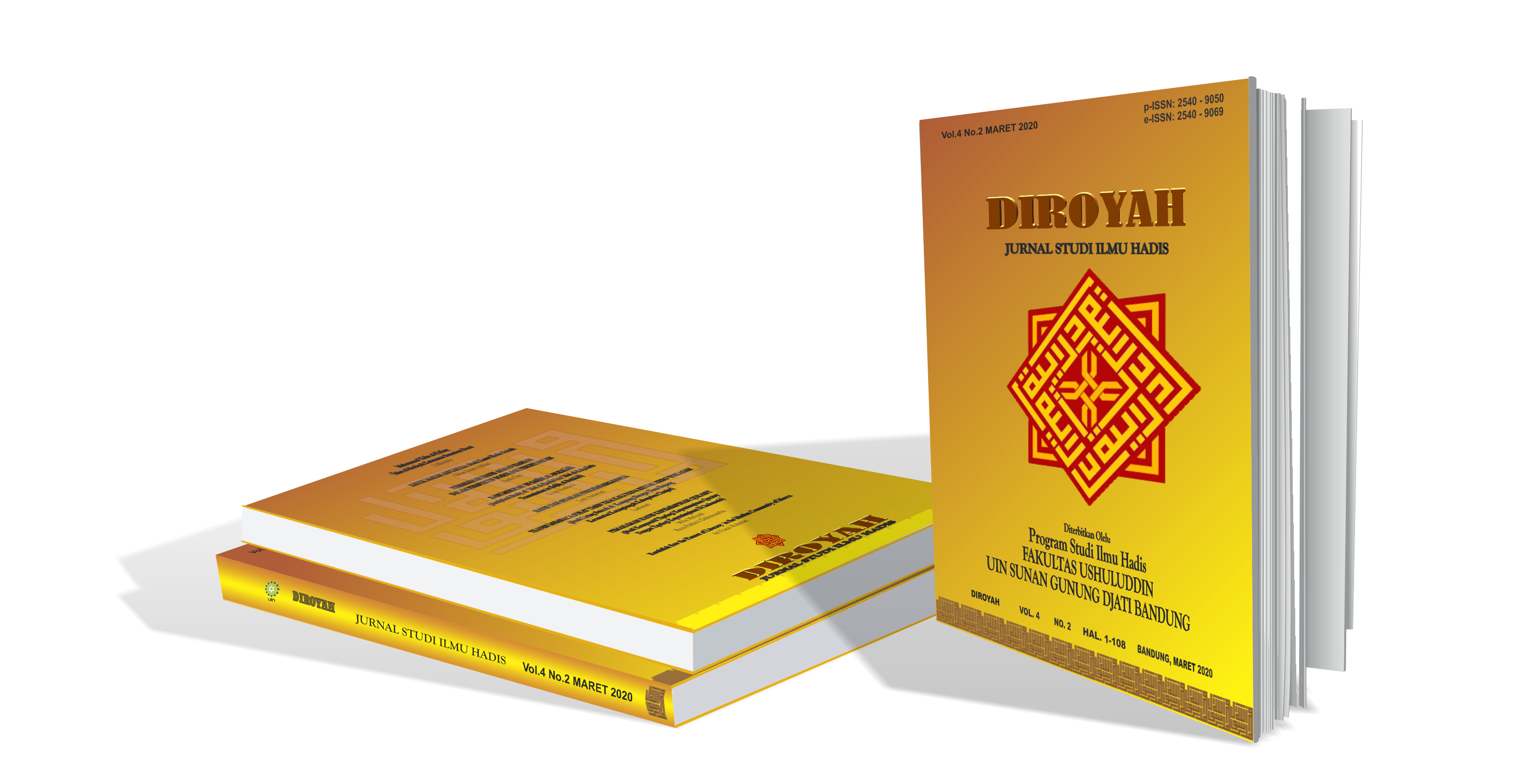Hoarding goods in the perspective of the Prophet's hadith, Legal analysis of a term “Ihtikâr†in Fiqh al-Hadith
Main Article Content
Abstract
Article Details
Authors who publish with this journal agree to the following terms:
- Authors retain copyright and grant the journal right of first publication with the work simultaneously licensed under a Creative Commons Attribution-NonCommercial-ShareAlike 4.0 International License that allows others to share the work with an acknowledgment of the work's authorship and initial publication in this journal.
- Authors are able to enter into separate, additional contractual arrangements for the non-exclusive distribution of the journal's published version of the work (e.g., post it to an institutional repository or publish it in a book), with an acknowledgment of its initial publication in this journal.
- Authors are permitted and encouraged to post their work online (e.g., in institutional repositories or on their website) prior to and during the submission process, as it can lead to productive exchanges, as well as earlier and greater citation of published work (See The Effect of Open Access).
References
Abu al-Husain Muslim bin HajjÄj al-QusyairÄ«, á¹¢ahÄ«h Muslim, RiyÄá¸: DÄr ‘Ālam al-Kutub, 1417 H/ 1996 M.
Abd Rahman al-SuyÅ«á¹Ä«, Syarh al-SuyÅ«á¹Ä« li Sunan al-NasÄÄ«, Halb: Maktab al-Maá¹bÅ«ah al-IslÄmiyah, 1406 H/1986 M.
Abu Isa Muhammad bin ĪsÄ al-Tirmiżī, Sunan al-Tirmiżī, Bairut: DÄr al-Kutub al-‘Ilmiyah, t.th.
Abd Rahman al-SuyÅ«á¹Ä«, Syarh al-SuyÅ«á¹Ä« li Sunan al-NasÄÄ«, Halb: Maktab al-Maá¹bÅ«ah al-IslÄmiyah, 1406 H/1986 M.
Aḥmad bin Ḥambal, Musnad Aḥmad, Bairut: DÄr al-Fikr, 1415 H/1995 M.
Aḥmad Farid, Min A’lam al-Salaf, Mesir: DÄr al-Iman al-Iskandariyah, 1998 M/1419H.
Arifuddin Ahmad, Metode Tematik dalam Pengkajian Hadis, Makassar: Rapat Senat Luar Biasa UIN Alauddin Makassar.
-----------------, Paradigma Baru Memahami Hadis Nabi, Cet. I, Jakarta: Renaisan, 2005.
A.J. Wensinck, al-Mu’jam al-Mufahras li AlfÄẓ al- Ḥadīṡ al-Nabawī’ an al-Kutub al-Sittah wa ‘an Musnad al-DÄrimÄ«, wa Muwatta’ al-MÄlik wa Musnad Aḥmad bin Hanbal, Istanbul, DÄr al-Da’wah, 1986.
Al-BukhÄrÄ«, Ḥasyiyah JÄmi’ al-á¹¢aḥīḥ, t.tp: Maktabah DÄr al-Iḥya al-Kutub al-‘Arabiyyah, t.th.
Al-DÄminÄ«, MaqÄyis Naqd Mutun al-Sunnah, RiyÄá¸: JÄmi’ah Ibn Sa’ūd,
Fakhruddin, I. (2020). IḥtikÄr dalam Pemikiran Imam Ghazali dan Yusuf Qardhawi. An-Nawa: Jurnal Studi Islam, 2(2), 66-83. https://doi.org/10.37758/annawa.v2i2.120.
Ghozaly, M. Y. A. (2016). Fiqh Al-Hadîts: Studi Genealogi Dan Metodologi, Tebuireng.
https://peraturan.bpk.go.id/Home/Details/45280/uu-no-5-tahun-1999.
https://m.liputan6.com/tag/penimbunan-minyak-goreng/video.
Ibn al-á¹¢alÄḥ, ‘UlÅ«m al-Ḥadīṡ, MadÄ«nah al-Munawwarah: al-Maktabah al-’Ilmiyyah, 1972.
Ibn Taimiyah, al-ĪmÄn, Kairo: DÄr al-Ṭiba’Ät al-Muḥammadiyah, t.th.
----------------, al-Amr bi al-Ma’rÅ«f wa al-Nahy ‘an al-Munkar, BeirÅ«t: DÄr al-Kitab al-JadÄ«d, 1976.
----------------, Majmū’ah al-FatÄwÄ, t.tp: DÄr al-Wafa’, t.th.
Ismanthono, H. W. (2003). Kamus istilah ekonomi populer. Penerbit Buku Kompas.
Iswardono, S. P. (1990). Ekonomi Mikro. Penerbit AMP YKPN, Yogakarta.
Karim, Adiwarman A., 2007, Ekonomi Mikro Islami, Jakarta: PT Raja Grafindo Persada.
Kamal, F., Abdullah, M. R. (2018). ANALISIS HUKUM EKONOMI ISLAM TERHADAP PRAKTEK IHTIKAR. Al-Amwal: Journal of Islamic Economic Law, 3(2), 186-197. DOI:10.24256/alw.v3i2.479.
Luia Ma’lÅ«f, Al-Munjid fÄ« al-Lughah wa al-A‘lÄm, Beirut DÄr al-Masyriq,1987.
Muhammad, F., Baharuddin Ahmad, M. H. I. (2021). Fikih Bisnis Syariah Kontemporer. Prenada Media.
MahmÅ«d al-ṬaḥḥÄn, TaisÄ«r Muá¹£á¹alaḥ al-ḤadÄ«s, RiyÄá¸: Maktabah al-Ma’Ärif, 1407 H/1987 M.
Moh. Yusni Amru Ghozaly, Fiqh al-Hadits, Tebuireng: Pustaka Tebireng, 2016.
Musá¹afÄ Muslim, MabÄḥis fÄ« al-TafsÄ«r al-Mauá¸Å«'Ä«, Damasqus: DÄr al-Qalam, 1410 H/1989 M.
Muḥammad Abdurraḥīm, TaḥzÄ«b al-Kamal FÄ« AsmÄi RijÄl, Libanon:DÄr al-Fikr:t.th.
Muḥammad bin IsmÄÄ«l al-BukhÄrÄ«, á¹¢aḥīḥ al-BukhÄrÄ«, KitÄb al-ĪmÄn bÄb al-Muslim Man Salim al-MuslimÅ«n min LisÄn, RiyÄá¸: DÄr ‘Ālam al-Kutub, 1996.
Muḥammad NÄá¹£ir al-DÄ«n al-AlbÄnÄ«, á¹¢aḥīḥ al-TargÄ«b wa al-TarhÄ«b, al-RiyÄá¸: Maktabah al-Ma’Ärif, t.th.
----------------, al-Silsilah al-Ḍa’īfah, RiyÄá¸: Maktabah al-Ma’Ärif, t.th.
----------------, Ḍa’īf al-TargÄ«b wa al-TarhÄ«b, RiyÄá¸: Maktabah al-Ma’Ärif, t.th.
Munawwir, A. W. (1994). Kamus Bahasa Arab Indonesia. Yogyakarta: Pesantren Al-Munawwir.
Pulungan, S. (2020). Peer Review dan hasil Similarity Monopoly in Islamic Perspective and Its Application in Life.
Putra, M. D., Amelia, F., & Putri, D. (2019). Dampak Ihtikar Terhadap Mekanisme Pasar Dalam Perspektif Islam. Imara: Jurnal Riset Ekonomi Islam, 3(2), 183-191.DOI: http://dx.doi.org/10.31958/imara.v3i2.1661.
Poerwadarminta, W. J. S. (1976). Kamus besar bahasa Indonesia. Jakarta: Balai Pustaka.
PP No. 69 Tahun 1948 tentang Perubahan Dalam Undang-Undang Nomor 20 Tahun 1948 Tentang Larangan Penimbunan Barang Penting.
Qaradawi, Yusuf, (1997) Norma dan Etika Ekonomi Islam. Terj. Zainal Arifin dan Dahli Husin. Jakarta: Gema Insani Press.
Qosim, N. (2018). TRANSAKSI JUAL-BELI DALAM BENTUK KHUSUS (Jual–beli Pesanan, Bay’al-Wafa’dan Ihtikar). Asy-Syari’ah, 4(2). https://doi.org/10.55210/assyariah.v4i2.108.
Rahman, K. A., Amoone, I. S., & El-Batani, O. I. (2014). Ice cream antioxidants agents and their must be oils comparision. Journal of Scientific Research and Development, 1(2), 15-22.
RAHMANIAH, A. (2009). KONSEP IHTIKAR DALAM HUKUM ISLAM (Studi Komparatif Terhadap Monopoli dalam Undang-undang Nomor 5 Tahun 1999 Tentang Larangan Praktek Monopoli dan Persaingan Usaha Tidak Sehat) (Doctoral dissertation, Universitas Islam Indonesia).
Ramdhani, D., Atichasari, A. S., Mulatsih, S. N., & Rays, M. (2020). Ekonomi islam: Akuntansi dan perbankan syariah (filosofis dan praktis di Indonesia dan dunia). CV MARKUMI.
Sabiq, S. (2014). Fiqh Sunnah, vol. 8, trans. Moh Thalib (Kuala Lumpur: Victory Agency, 1990), 162.
Siddiqi, M. N. (1996). Role of the state in the economy: An Islamic perspective (Vol. 20). Islamic Economics. Journal of Islamic Studies, Volume 8, Issue 1, January 1997, Pages 138–140, https://doi.org/10.1093/jis/8.1.138.

